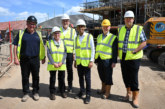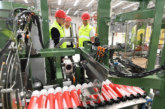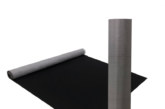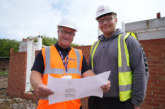
Richard Clement, Deputy General Manager at Smart Construction, offers his thoughts on the biggest digital and technological trends in construction for 2024.
As the UK Government’s deadline for the digital transformation looms, industries across the board are diversifying strategies, internal and external approaches and implementation of services to ensure cutting edge digital technology is embedded to drive business efficiencies and meet new industry standards.
Rapid change and adoption of digitisation is paramount in the construction industry to position the UK market alongside construction markets globally and general business infrastructure worldwide.
The rise of Smart Technology — why 2024 is the year to implement change
Richard sais: “Businesses across multiple sectors have been implementing smart tech at a rapid pace – but construction has historically fallen behind, meaning that 2024 is the year to take the bull by the horns and invest in smart technology.
“We are now seeing businesses of all sizes investing in smart technology to reduce supply chain hurdles and improve forecasting capabilities at all points of the construction journey. Due to uncertainty at the job site, investing in technology and smart solutions will help identify and prevent issues before they happen. At the close of a tumultuous year for inflation, savings are more important than ever and precise calculations are made possible by accurate insight and data collection.”
One such example of smart technology benefiting supply chain hurdles and improving internal cost saving is that of Smart Construction customer, ECOSOIL Nord West GmBH. The firm employs around 300 people, and specialises in brownfield activities including land rehabilitation, environment-friendly earthworks and landfill construction. Working in partnership with the solution provider, ECOSOIL Nord West leveraged as-built data from its intelligent machines to monitor daily productivity at the Lager Waldteich project site.
The Lager Waldteich project site’s primary objective was to build a retaining structure for the former Waldteich coal storage site, into which contaminated soil could be deposited. Site data was required by site manager Thomas Vent, who wished to manage and track in real time the volume of material movement each day, ensuring new material could be ordered and delivered in time to reduce bottlenecks and pressure points. Working with experts from Smart Construction, it was advised that ECOSOIL make use of as-built intelligent machine data. Benefits were instantaneous.
Vent saved around 16 hours a month — two full working days — in time that would otherwise have been lost to travelling, surveying and processing data. Vent and his team were also able to identify any anomalies in daily performance and correct problems before they became more prominent, meaning he was also able to manage unforeseen costs.
“At Smart Construction, we’ve designed an innovative portfolio of solutions, utilising hardware and software to create a full complement of IoT (Internet of Things) tools. This encompasses as-built data presented on our Dashboard gleaned from 3D Machine Guidance retrofit equipment as well as intelligent Machine Control, which is installed on a number of Komatsu machines. Smart Construction’s Remote offers site management the flexibility to send new design data to the field remotely, ensuring that teams are working off the most up-to-date plans for a project. These are simply a few ways smart technology and IoT can support in creating an even more profitable job site.
Drones and surveying: a new way to approach the site
Survey data has long been a prerequisite for construction, with regular site surveillance common practice for earthworks projects and prep for vertical builds. Regular site data has been historically collected with survey teams journeying to site and taking individual readings to build a comprehensive view of the site, pinpointing any areas of concern and building an ongoing view of the works.
Richard believes this has seen a huge shift, saying: “Surveying was historically time consuming, labour intensive and fairly short sighted in terms of outputs, with results delivered back to clients over a course of days or weeks, by which point many measurements can be out of date. With the introduction of drone technology at the job site, managers are able to take more regular measurements of the terrain, with more data available to them including material moved over a given time period, changes in terrain profile, and more. These changes have been rapid, and have helped the industry reach new levels of efficiency, making surveying much more self-sufficient.
“Not only does this reduce cost due to the fact that external surveying teams no longer need to make long journeys to site, but also offers more effective insight in much quicker time to make decisions.”
Connected Construction sites and their impact on the landscape
Using IoT connected sensors, devices and software, Connected Construction sites connect people, equipment and data. This allows real time communication and collaboration between all stakeholders, according to Richard.
Richard said: “One of the significant challenges faced in earthmoving tasks is the unpredictability of what lies beneath the surface. Despite careful planning, unexpected conditions often emerge once digging commences, disrupting original plans. Instead of merely dealing with these unforeseen circumstances as they arise, a connected site offers a more dynamic solution. It monitors site activities, assesses any deviations, and modifies the plan accordingly, ensuring continuous alignment with the project’s requirements.
“Employing an updated digital twin for all job sites will allow the industry to visualise, plan and execute with precision. Instead of using the digital twin as a reactive tool to troubleshoot issues, it can be utilised proactively in the planning stage. This proactive approach will ensure that projects are executed with confidence, knowing that the plans are well-informed and feasible.”
As technology continues to be at the forefront of investment and business growth, the efficient application of connected construction sites looks to be revolutionising the industry in 2024.
For more information about Smart Construction, please visit smartconstruction.io.
Header image: ©Who is Danny/AdobeStock










